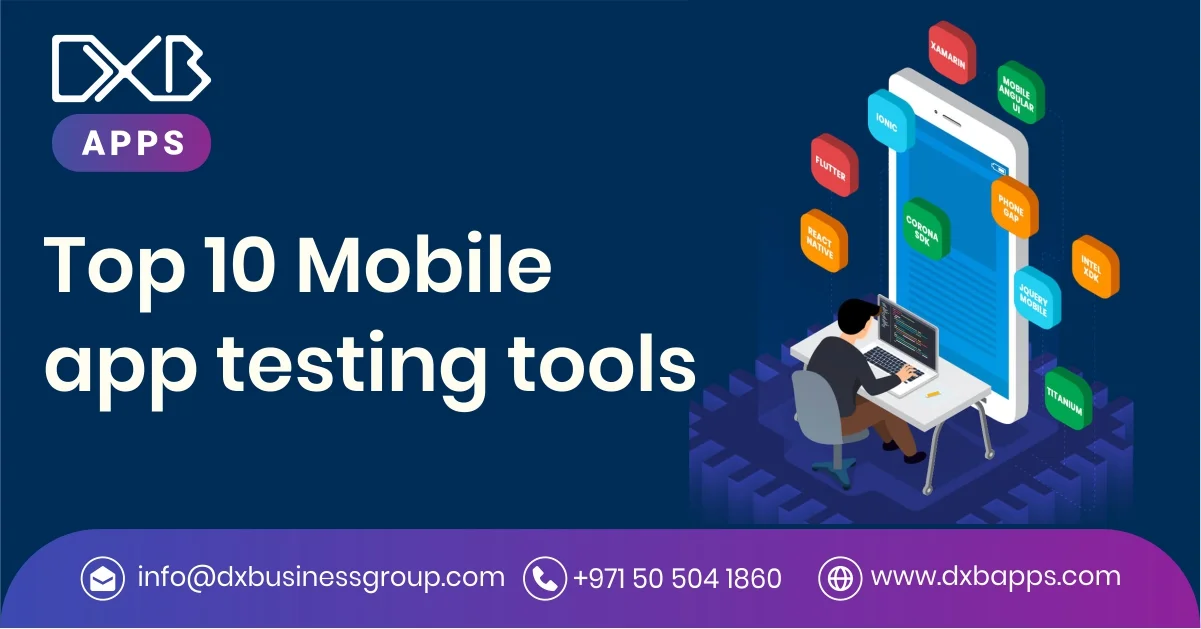Mobile testing tools help in boosting the coverage, precision, and efficiency of a program evolved to work on an Android or iOS platform. In this article, we have mentioned some of the best tools for mobile testing that can help you precisely develop mobile products. These are absolutely important for iPhone apps developers around the world, android apps developer teams in Dubai, and other tech giant nations in the world.
Most developed nations like Dubai where tech is booming are promoting new technologies such as these, these are mostly being used by top mobile app development companies in Dubai, some of the pioneers in the mobile app development market of UAE as well as expert mobile app developers in Dubai. Thus we can pretty much guess how important mobile app developers are in Dubai.
Mobile app testing happens to play a vital role in app development. As time keeps passing by, the worth and practicality of mobile testing are growing as companies are developing multiple mobile products and wish to get a real taste of their target audience and their experiences while using the applications. While making a decision, on whom to choose from a wide variety of options, it is absolutely necessary to keep in mind all the pros and cons before you jump into anything.
This article aims to provide you with the essential details of some of the top mobile testing tools or other identical automation frameworks to assist you in making a perfect choice!
1. TestComplete
TestComplete is an automated UI testing tool that makes it quick and easy to create, maintain, and accomplish functional tests on desktops, web, and mobile applications. With TestComplete, you can improve test coverage and make sure you ship excellent, battle-tested software.
TestComplete offers great support for all popular desktop technologies, including Java (Swing, AWT), Delphi (VCL), WPF/Silverlight, Visual Basic 6/MFC, and WinForms/Win32.
1.1 Key features:
-
Record and replay actions on mobile devices in order to create automated test scripts;
-
Build robust UI tests for both native and hybrid apps;
-
Reuse existing functional tests for mobile apps by recording them on a desktop device;
-
Create keyword-driven tests with the help of the keyword editor;
-
Run tests on real devices or emulators without jailbreaking/rooting your device;
-
Run multiple emulators simultaneously to test your app's behavior under different operating system versions;
-
Use out-of-the-box test reporting or integrate with Jenkins or other CI systems to report on test results;
-
Integrate with 3rd party bugs tracking systems such as Jira, Bugzilla, FogBugz, and many others to automatically report bugs when a test fails.
2. Apptim
Apptim is an intelligent tool that provides a simple UI for testing your mobile apps' performance by running automated tests which record data about the app's resource usage, crashes, exceptions, and overall behavior. It allows you to fully test your mobile app on both iOS and Android.
In the case of a mobile app, if it loads in 2 seconds instead of 3 or 4, users will be happier. And with a better user experience, the app will get more conversions and make more money. App developers and testers must measure the app performance to test their mobile apps on both iOS and Android before they go live. But often, it is easier said than done. The typical tools used for measuring app performance are complicated to set up and use.
3. Kobiton
Kobiton is a mobile app testing platform that helps you enhance the quality of your apps through manual and automated testing on real devices. It is built on top of the Appium open-source infrastructure and is constantly working on adding the most recent OS updates and hardware to the system for a better experience. It permits you to evaluate devices without undergoing numerous script modifications.
3.1 Kobiton's key features include:
-
Device lab management - Get access to an extensive collection of physical Android and iOS mobile devices that are constantly updated with the latest OS versions, screen resolutions, and form factors.
-
Real-time debug - Get real-time debugging via SSH tunneling or live video streaming from all Kobiton-hosted devices.
-
Parallel Testing - Run tests in parallel on multiple devices to reduce execution times.
4. Robotium
Robotium is a simple framework to write powerful and robust automatic black-box test cases for Android applications. With the help of Robotium, test case developers can write function, system, and user acceptance test structures, extending over multiple Android activities.
Robotium can be used to test many different hardware devices such as smartphones, tablets, etc. For each device type you want to test, you must download the corresponding SDK. Also, Robotium has the ability to interact with multiple Android activities at the same time (i.e., it can interact with one activity while another activity is in the background).
Robotium supports both native and third-party applications (i.e., it can also control other applications). The basic idea behind this framework was inspired by Selenium which is a web browser automation framework developed by ThoughtWorks Incorporated.
5. Appium
Appium is a complete open-source test automation structured tool for use with native, hybrid, and mobile web apps. It operates iOS and Android applications using the WebDriver protocol. Appium is established on the idea that testing domestic apps shouldn't necessarily require including an SDK or revamping your app.
And that you should be able to utilize your selected test practices, frameworks, and tools. Appium tries to automate any mobile app from any language and any test structure, with complete access to back-end APIs and DBs from test code.
5.1 Main Features of Appium:
-
Appium is an HTTP server written in NodeJS that creates and handles multiple WebDriver sessions for different platforms like iOS and Android. It enables you to test all kinds of mobile applications: native, hybrid, and mobile web.
-
Appium initiates a “test case” on the device that produces a server and listens for proxied commands from the main Appium server. These commands are then sent to Apple’s UIAutomation library or Google’s UiAutomator framework (on Android Versions equal to or higher than API level 16) using Selendroid (on older Android versions) in order to perform the desired interactions on the device.
6. MonkeyTalk
MonkeyTalk comes with its own IDE (Integrated Development Environment) and agent, which acts as a test harness for the apps under test. MonkeyTalk is an object-based automation tool where the objects are identified by the name of the UI elements in the app and there is no need to add any scripts to the app. The script can be recorded using the MonkeyTalk IDE.
MonkeyTalk uses a keyword-driven approach to script recording where each action performed on a UI element is recorded as a command with an associated argument. The commands and arguments together form what we refer to as a Test Script.
MonkeyTalk has several advantages over other tools like Robotium, Calabash, etc. It supports both iOS and Android apps and scripts can be recorded for both types of apps in one MonkeyTalk IDE. MonkeyTalk can be used to test all the apps written in native, hybrid, or web technologies. There is no need to modify your code or add any MonkeyTalk library to your codebase (as it is required for other tools). It works on real devices, simulators/emulators, and over network/network proxy setup. This makes it great for running automated tests across multiple devices simultaneously on your CI system
7. eggPlant
Image-Based Testing is the most highlighted feature of EggPlant. It provides you with a single point of truth for all your test automation needs. The tool has been designed to check the responsiveness and functionality of any application, irrespective of the platform it has been built on.
The image-based approach to GUI testing is a unique feature of EggPlant that distinguishes it from other similar tools available in the market. It does not rely on coding, comparing source code, or recording browser events.
Instead, it captures screenshots of an application and tests them against expected results by using a powerful set of search and match functions based on image processing algorithms. This way, it enables testers to create cross-platform test cases that are not only easy to update and maintain but also much faster to execute than those created using conventional methods.
8. 21
21, one of the leading test automation providers, is offering a cloud-based testing solution, which enables software engineers to automate all the testing activities. The platform helps you in creating test cases for all mobile apps and web apps easily. What’s more exciting about this platform is that it allows you to perform tests on several mobile devices simultaneously.
9. Espresso
Espresso is a mobile testing framework that offers a wide range of useful annotations and assertions to write reliable UI tests for Android apps. These can be used with Java or Kotlin.
It was developed by Google, and it automatically syncs the test actions with the UI of the app under test. Espresso also runs on the JVM, which makes it easier to run tests written in Java. An espresso is a popular tool that is easily accessible for testing Android applications, but it does not support iOS applications or any other platforms.
10. Ranorex Studio
Ranorex Studio is an all-in-one tool for mobile testing. It delivers amazing all-in-one easy-to-use mobile app testing: both native and hybrid, on real devices and emulators, on iOS and Android. This mobile app testing solution combines reliable object identification based on image and text recognition with the ability of Ranorex to interact with web elements even if their IDs are dynamic. Ranorex Studio also offers an extensive API for creating custom solutions for your very special needs.
As an app developer, you know that mobile application testing is a crucial step toward launching a successful product. Yet, manual testing of mobile apps can be slow and costly, and it may not cover the range of devices your users have.
Automated mobile testing can accelerate your time to market while increasing test coverage. But what mobile automation testing tools should you use? There are hundreds of mobile app testing tools claiming to be able to test your application automatically.
This guide will give you the information you need to select the right automated mobile testing tools for your organization. We’ll explain key features, pricing, and benefits so that you can make an informed decision that meets your unique testing needs.


![Cost & Mechanisms Required To Build An App Like Snapchat [Roadmap + Costing] To Know In 2024](https://dxbapps.com/blog/uploads/post_image/24010643139139.webp)



